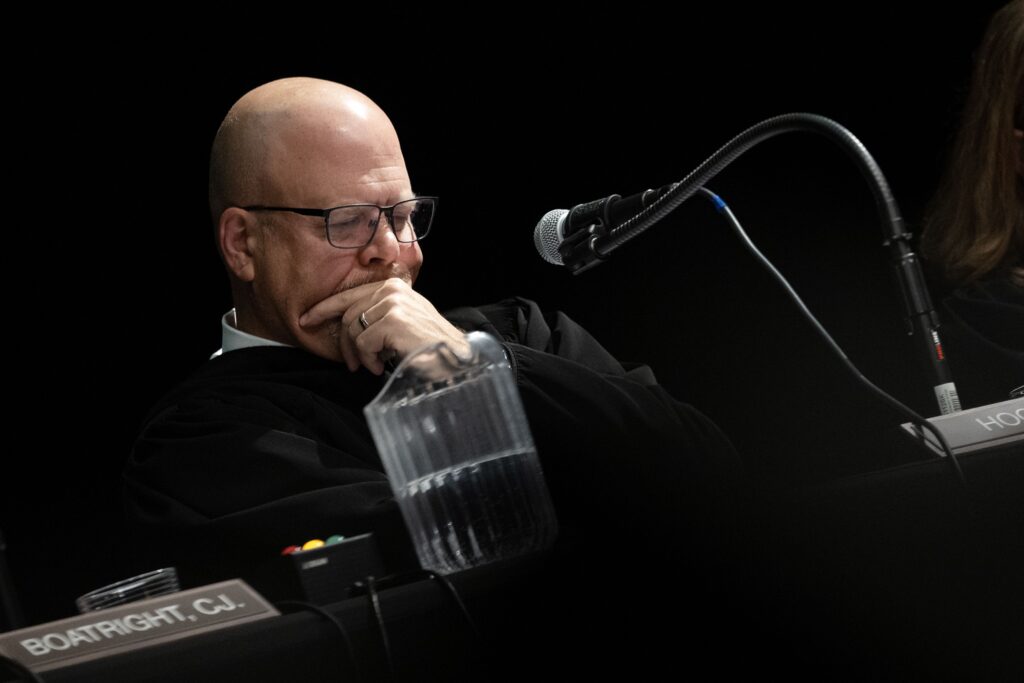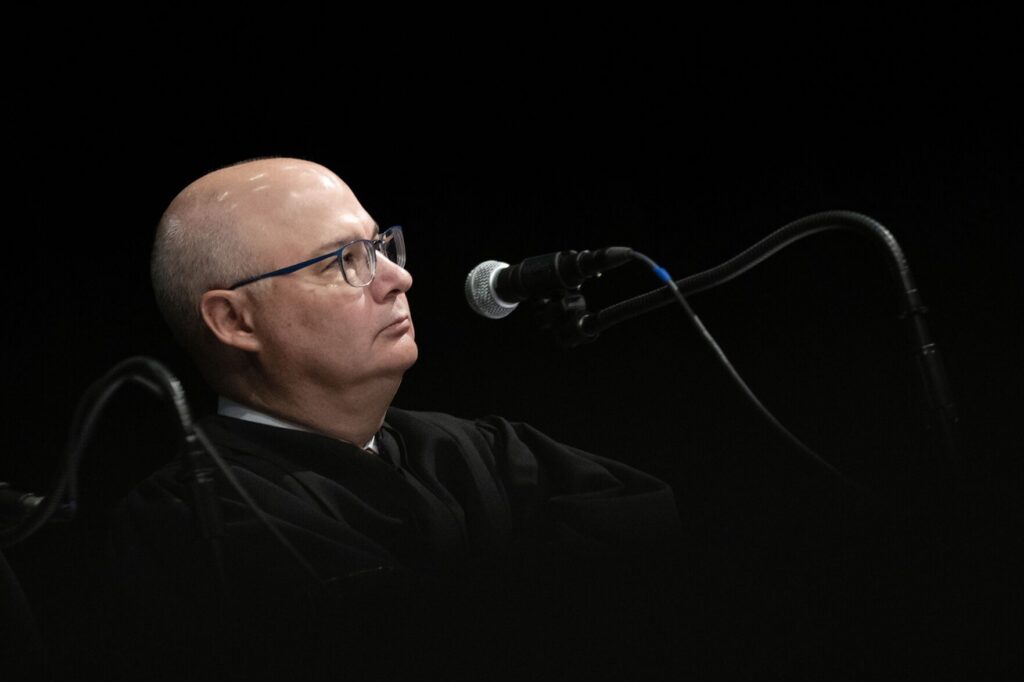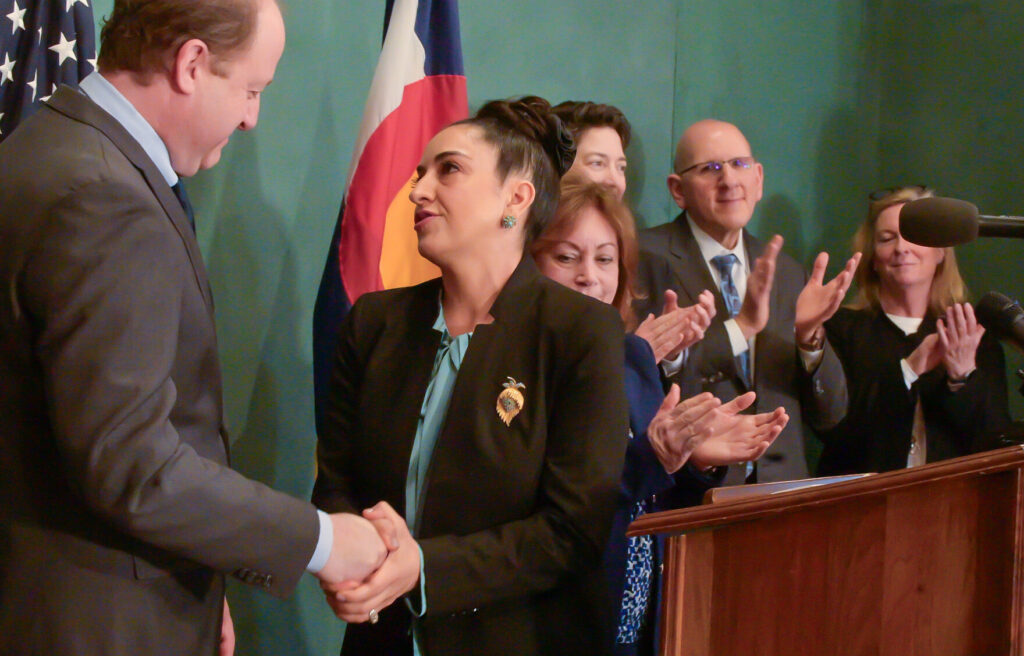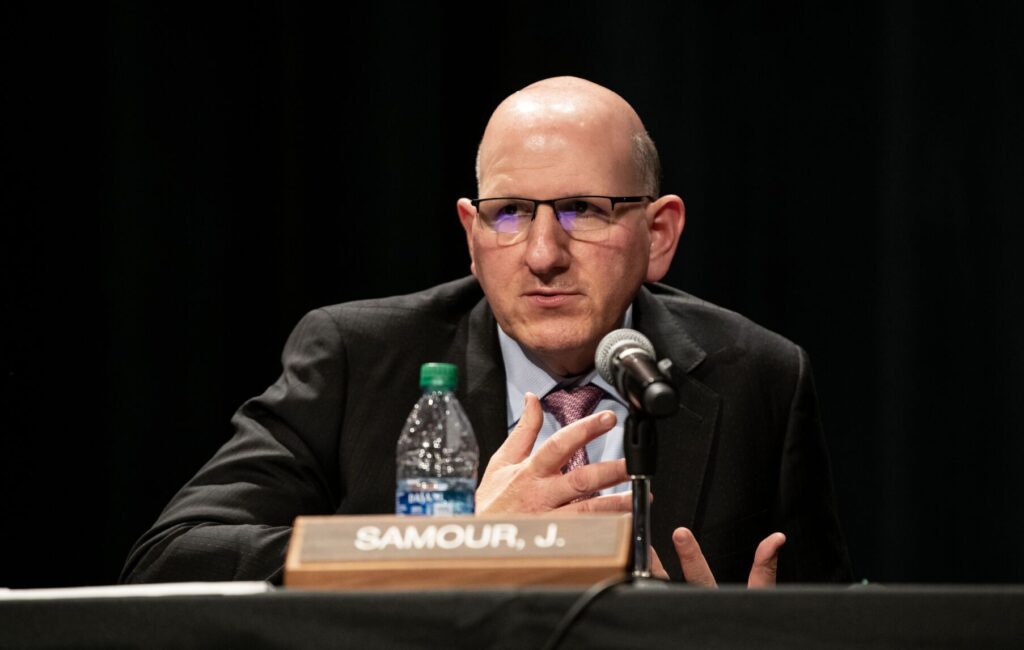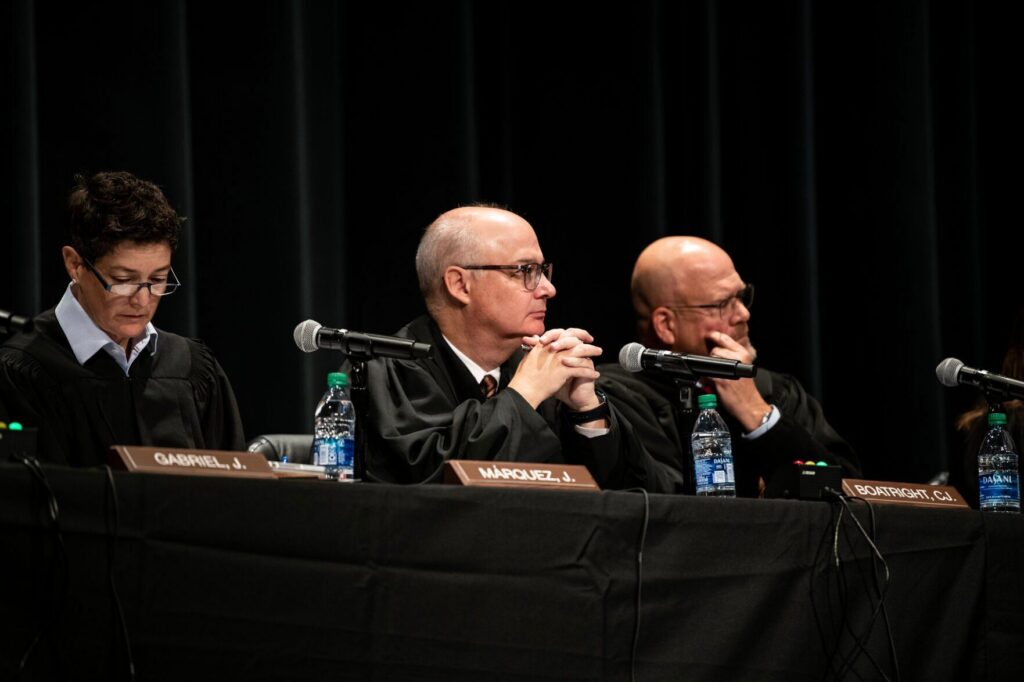Colorado justices, judges tell applicants what to expect when applying for the bench
Members of Colorado’s judiciary spoke on Friday to more than three dozen people who are interested in becoming state judges, and hammered home a consistent theme: At the very beginning, they need to have a reason why they want to be a judge in the first place.
“I have chaired probably hundreds of these commission meetings across the state over the last 15 years,” said Chief Justice Monica M. Márquez. “If I had a dollar every time someone said a version of — with arm folded over the chair — ‘It’s the natural next step’ or some version of ‘I’ve earned this,’ I’d be so rich and could retire tomorrow.”
She added that being “in love with the idea” of being a judge was not compelling, either.
“There’s definitely prestige attached to that. There’s definitely power when you don that robe. But there’s so much more to that position, and that can’t be the animating reason,” said Márquez. “The decisions you’ll have to deal with are weighty. There’s a lot of lost sleep. There’s a lot of stress.”
In Colorado, attorneys and — in some smaller jurisdictions — non-attorneys submit applications to nominating commissions when judicial vacancies arise. Chaired by a member of the Supreme Court, the commissions contain a mix of lawyers and non-lawyers. After interviewing applicants, the commissions forward up to three names to the governor’s office. Upon interviewing the candidates once more, the governor’s office then appoints one of the finalists to fill the vacancy.
The Colorado Women’s Bar Association Foundation and the judicial branch offered the May 23 symposium at the Colorado Bar Association’s headquarters for people to hear from judges directly about the process of joining the bench. In recent years, and due in part to legislation establishing an outreach position for judicial vacancies, Colorado’s bench has almost reached gender parity and has seen increases in the percentage of Black and Hispanic judges.
“I think everybody in this room would agree — maybe not outside of this room — that all of our institutions are better off and stronger when there are more women and more diverse members of the institution,” said Court of Appeals Judge Elizabeth L. Harris, speaking on behalf of the foundation’s board.
Márquez mentioned the General Assembly recently granted, in part, the judiciary’s request for additional judgeships, with 15 new seats created between July 2025-2026. Although the judicial branch sought twice as many judgeships originally, Márquez promised to ask lawmakers to fund the additional positions in the future.
Justice Richard L. Gabriel told attendees that fewer people are currently applying to be judges.
“I’m not sure quite why that is. Maybe a matter of negativity out there about public institutions or fear of the workload. The workload is tough, but you learn how to stay on top of it,” he said.
Gabriel advised potential applicants to be “deadly honest” when submitting their materials, and not to conceal problematic aspects of their past. He also reminded attendees there are ways to avoid pitfalls should they become judges.
“It’s very easy to pick up a case and say, ‘Oh, this is just like all these other ones. I’ve seen this before.’ And just make an assumption this is a typical eviction case, a typical whatever kind of case — and miss a fact because you’re going so fast you have made an assumption as to what’s in the case,” he said.
Gabriel also described an instance he regretted during oral arguments in an unidentified case, where he appeared to become too personally invested.
“My intention was to express — we were in the weeds on jurisdiction, some legal argument — and somebody died in this case. And my intention was to say, ‘I’m sympathetic to you…’. That was a mistake,” he said. “One of my colleagues said, ‘That wasn’t a good thing to say.’ And I said, ‘You’re right.'”
Multiple trial judges also sat on a series of panels to discuss their transitions onto the bench and to encourage future judges to reflect on what they could bring to the specific court where they are applying.
Boulder County District Court Judge Dea M. Lindsey said she previously lived in Weld County but worked as an attorney in Boulder County. Although she applied in both jurisdictions, she said she had a tougher time in the county where she was not working at the time.
“I’m not trying to dissuade anybody from applying in different jurisdictions,” she said. “But my experience in Boulder has been, even when we were hiring magistrates, ‘This person is from Jeffco. Great, great magistrate. But this (other) person has appeared in our courtroom’.”
In also encouraging attendees to think carefully about their moves, Chief Judge Susan Blanco of the Eighth Judicial District of Larimer and Jackson counties said she initially applied to a county court vacancy unsuccessfully, but she bypassed the next opening before applying eventually for the district court.
“It wouldn’t have been the right fit for me,” she said. “And I didn’t do enough self-exploration before I submitted my application.”
Kara Veitch, the chief legal counsel for Gov. Jared Polis, said she has participated in approximately 400 interviews for judicial vacancies.
“These are really, really hard jobs. Maybe 10-15 years ago, we thought of them as a capstone to your career and a retirement gig. This is not a retirement gig,” she said.
Veitch advised applicants to compile endorsement letters from “a variety of angles” and to highlight their work on cases that illustrate their problem-solving abilities and thoughtfulness — not necessarily the most high-profile litigation. She also told people to respond directly to the questions asked of them, and not to give the “political answer.”
“You can tell when people are answering the question in the way they think we want them to answer it. These are not political interviews,” she said. “We’ve had some people come in and say, ‘I want to be in this job to help advance Gov. Polis’ agenda.’ We are like, ‘Whoa! That is not this job.'”
Panelists further spoke about avoiding “imposter syndrome” or about being afraid to express their identity even after successfully getting a seat on the bench.
“Even those moves where you’re putting up Ketanji Brown Jackson, you’re putting out Bryan Stevenson (memorabilia) — my office is full of Black heroes because those are my heroes,” said Lindsey. “And I was still like, ‘I hope somebody doesn’t come in and say some (stuff)’.”
Denver District Court Judge Jon J. Olafson recalled jokingly referring to an area of his courtroom as the spot where people would “lip sync for their life” — an allusion to the LGBTQ-themed reality show “RuPaul’s Drag Race.”
“Judges for centuries have been calling different things different things. Why should I feel bad about calling something from my perspective?” he said. “It was in a different language. But I was so nervous about that because it was so different from what I’ve heard in a courtroom.”
Colorado Politics Must-Reads:






